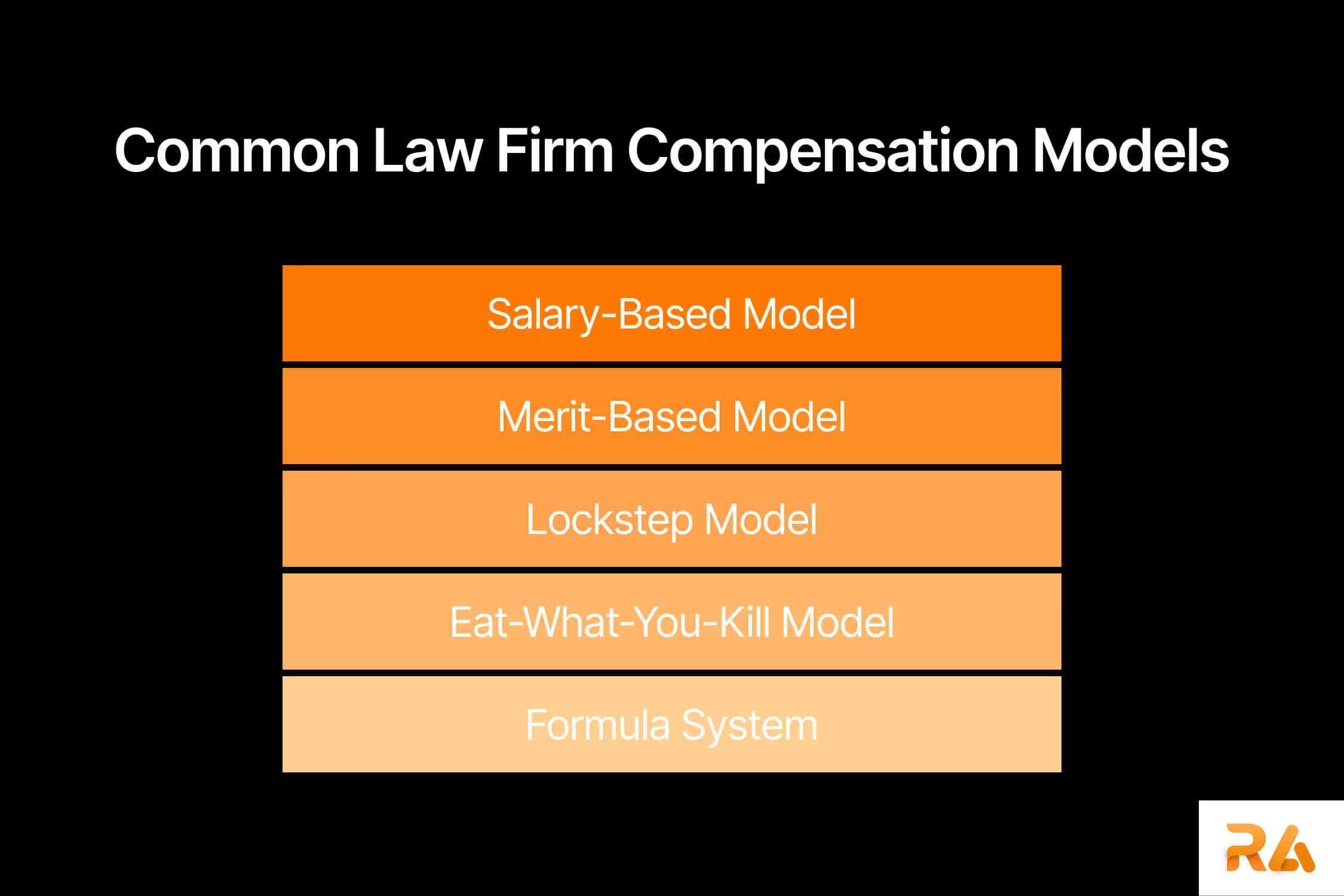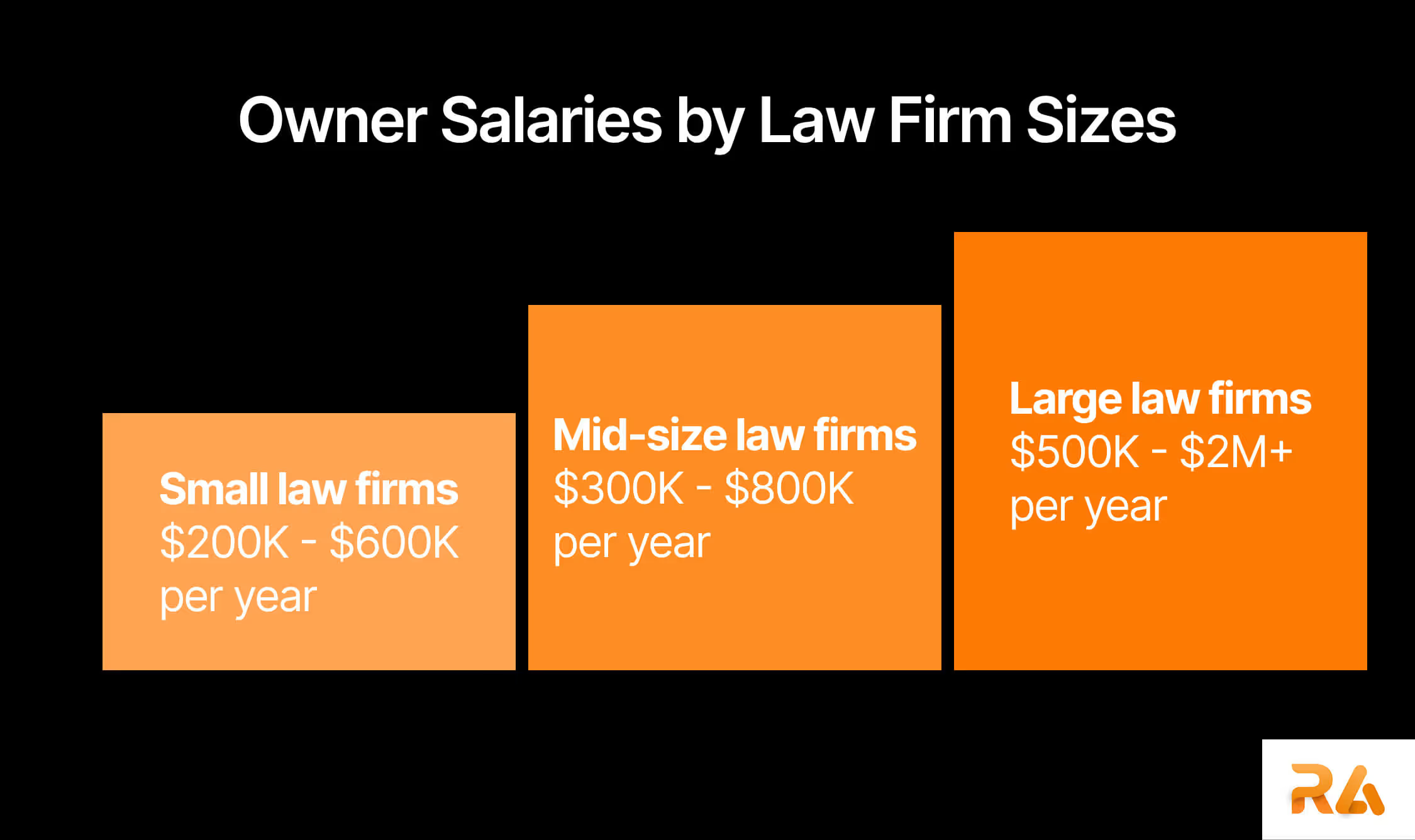The financial rewards of owning a law firm often motivate attorneys considering the entrepreneurial path. While the legal profession is known for its high earning potential, the income of law firm owners varies widely based on factors such as firm size, practice area, and state. According to the latest attorney compensation report from Glassdoor, law firm owners in the U.S. made an average of $307,907 per year in 2025.
This guide aims to provide clarity on what law firm owners can realistically expect to earn in the United States and what strategies can increase profitability. Whether you're considering starting your own practice or benchmarking your current earnings, understanding these financial dynamics is essential for making informed career decisions.
What is a Law Firm Owner?
Before we get into earnings, let’s first understand what a law firm owner is.
A law firm owner is a lawyer who holds an equity stake in a legal practice and is responsible for both the business and legal operations of the firm. It’s important to understand that law firms typically do not have CEOs like traditional companies. Instead, they are often structured around partnerships, and ownership can take several forms:
- Sole Proprietor: An individual attorney who owns 100% of their practice.
- Managing Partner: A senior attorney with both ownership stake and management responsibilities within a partnership.
- Equity Partner: An attorney who has invested capital in the firm and shares in its profits.
- Shareholder: In law firms structured as corporations, ownership is held through shares.
Unlike associates who get a fixed salary regardless of firm performance, owners’ compensation is directly tied to the profitability of the business. They are more involved in running the law firm as a business, which creates both opportunities and risks—including the potential for much higher earnings.
Understanding law firm partner compensation
Law firm owner compensation is considerably more complex than the standard salary-based pay of associates. An owner’s income is typically tied to the firm’s performance, structure, and profit distribution model. So, with all these questions in mind, how much money can a law firm owner in the U.S. actually make?
According to Major, Lindsey & Africa’s 2024 compensation report, the average compensation for law firm owners has nearly doubled over the past decade, reaching $1,411,000 per year with a 26% increase in just the last two years. Meanwhile, Glassdoor's 2025 compensation report, based on self-reported salaries across a broader range of firms, shows that law firm owners in the U.S. earn an average of $307,907 per year. This includes a base salary of $213,201 and an additional $94,705 annually from bonuses, profit sharing, or commissions.
While national averages are helpful, individual earnings vary widely based on several key factors:
Location: Law firm owners in major metro areas or high-cost states tend to earn more due to higher billing rates and client budgets. The American Bar Association’s 2024 Profile of the Legal Profession report shows that California and New York are the highest-earning locations.
Practice Area: Different legal practice areas have different hourly rates, so earnings often vary.
Firm Size: Larger firms have greater resources and can take on more clients and cases, leading to higher revenue and profit-sharing opportunities.
Law Firm Compensation Models

Beyond those factors, compensation models also play a major role in how much a law firm owner earns. Here are the most common structures:
- Salary-Based Model: Some law firm owners, particularly in smaller or newer firms, choose to pay themselves a fixed salary. This offers financial stability and predictability, especially when firm revenue is inconsistent.
- Merit-Based Model: In this model, compensation is tied to individual performance metrics such as billable hours, client satisfaction, or leadership contributions. It incentivizes productivity and initiative, with high-performing partners rewarded with a larger share of the profits.
- Lockstep Model: This model rewards longevity over individual performance. Partner compensation increases over time based on seniority and years of service. Every partner within a tier receives the same pay regardless of how much revenue they personally generate.
- Eat-What-You-Kill Model: This performance-driven model ties a partner’s compensation directly to the revenue they generate. If a partner brings in a significant number of clients or high-value cases, their earnings reflect that success. It functions similarly to a commission-based structure, commonly seen in sales.
- Formula System: The formula model calculates compensation using a mix of metrics such as billable hours, client origination, collections, seniority, and firm contributions. Each factor is weighted, and the formula determines each partner’s share of the profits.
Path to Becoming a Law Firm Owner
Becoming a law firm owner is a career milestone that can be achieved through different routes, each with its own set of challenges and rewards.
The most common starting point is getting licensed. This means completing law school and passing the bar exam in the state where you want to practice. Once licensed, the next step is gaining real-world experience. Spend several years honing your legal skills, developing a strong client base, and building a professional network. This foundation will better prepare you for ownership, no matter which path you choose.
Starting Your Own Practice
Starting your own firm is an entrepreneurial choice that comes with minimal initial capital but high risk. You'll have complete control over business decisions, but the responsibility is entirely on you. Generally, starting a small law firm in the United States costs around $18,850 to $45,500. While you gain instant ownership, it may take 3–5 years to reach stable profitability.
Climbing the Partnership Track
This traditional path involves working your way up within an established firm, typically starting as an associate. According to Indeed Career Guide, many firms consider promoting an associate after 7-10 years of experience. The journey includes gradually taking on more responsibility and developing a client base.
Buying Into a Practice
Another route is buying into an existing practice, which requires substantial capital but offers an immediate client base. This path may also provide mentorship opportunities from retiring attorneys.
Key Milestones to Ownership
No matter the path you choose, success as a firm owner involves:
- Demonstrating legal expertise in your chosen practice area
- Building strong business and client relationships
- Developing leadership and communication skills
- Understanding firm finances and management
- Accumulating capital for investment
Each path has its own unique challenges and requires careful planning. A long-term commitment to personal and professional development is essential for sustained success as a law firm owner.
Comparing Owner Salaries for Different Law Firm Sizes
When examining law firm owner earnings, firm size is one of the most impactful predictors of income potential. At the top of the scale, according to the 2025 Am Law 100, which ranks the top 100 highest-grossing law firms in the United States, average partner profits at top firms reached $3.15 million, reflecting a 12.3% increase from the previous year.

However, not every firm operates at that level. To put things into perspective, here’s a breakdown of how much a law firm owner typically earns based on firm size:
- Small law firms: Owners of small firms often make between $200,000 and $600,000 annually. While the scale is smaller, shared overhead costs and niche specialization can help sustain solid profits.
- Mid-size Law firms: Owner compensation at mid-sized firms generally ranges from $300,000 to $800,000, depending on the firm's niche, location, and client base.
- Large law firms: Commonly referred to as "Big Law," large firms offer the highest earning potential. Equity partners or founding owners can earn anywhere from $500,000 to several million dollars per year, thanks to more resources and high-value clients.
It's important to note that the number of lawyers on your team does not determine your firm’s profitability. Instead, profitability is driven by your business model, client base, practice area, and how you manage your operations.
Profitability by Law Firm Practice Area
Not all legal specialties generate the same level of revenue. Some practice areas consistently bring in more profits. According to Clio’s 2024 report, corporate law ranks as the most profitable.
Corporate law firm owners had the highest annual average total compensation at $1,488,000. Clients in this area often have substantial legal budgets and ongoing legal needs, especially for matters involving mergers, acquisitions, contracts, and regulatory compliance.
Tax law ranked second, with owners earning an average of $1,145,000 per year, followed by litigation, where firm owners reported average earnings of $1,054,000.
On the lower end, labor and employment law owners reported the lowest average compensation at $653,000 annually.
Challenges for Compensation as a Law Firm Owner
While the earning potential of law firm ownership can be substantial, it doesn’t come without its challenges.
- Unpredictable Cash Flow: Income as an owner isn’t always steady. It often comes from inconsistent streams, requiring careful financial planning. Some months may bring in high revenue from closed cases or new clients, while others can be unexpectedly slow.
- Overhead Management: Before an owner sees profit, they must pay for staff salaries, office space, software, insurance, and other operational expenses. Even highly profitable firms can feel the pressure of overhead if costs aren’t managed properly. That’s why many law firms are adapting by using a remote setup, hiring legal staff to work virtually in order to reduce expenses while maintaining the same level of service quality.
- Client Acquisition Pressure: Unlike associates who are handed cases, firm owners often have to bring in their own business. Client development takes time, consistency, and marketing investment to both nurture existing relationships and attract new clients.
- Billing and Collection Delays: Even after the legal work is completed, owners often face payment delays or unpaid invoices. This affects cash flow and forces them to take on administrative responsibilities.
Tips to Build a Profitable Law Firm as an Owner
Owning a law firm has its own set of challenges. While legal expertise remains essential, profitability depends on how well you manage your operations. Here are five key strategies to help you build a sustainable and profitable legal practice:
1. Focus on the Business
You're no longer just an attorney. You're also a business owner, which means thinking beyond billable hours and legal work. You need to manage budgets, understand marketing, build workflows, and oversee operations.
2. Niche down
Specializing in one area of law helps you stand out in a crowded market. Clients trust specialists more, and niche services often command higher fees. Whether it's corporate law, IP law, or personal injury, narrowing your focus can build your reputation and attract high-value clients.
3. Invest in Business Development
Allocate time and resources to grow your business presence and credibility. Focus on client acquisition and retention strategies. As the legal industry becomes more digital, it's essential to market your firm online. Building trust through your digital presence and client experience can lead to a strong referral network and a steady pipeline of new clients.
4. Outsource & Automate
You don’t have to do everything yourself. Use modern tools and platforms to automate administrative tasks. Staffing providers like Remote Attorneys can connect you with attorneys and paralegals who handle legal and admin work, freeing up your time for higher value tasks, often at a lower cost than hiring full-time staff.

5. Track KPIs
Data shows you what’s working and what needs improvement. Monitor key metrics like billable hours, client acquisition cost, case close rates, and profit margins. Tracking KPIs gives you the insights needed to adjust your strategy, allocate resources wisely, and make smarter business decisions.
Final Thoughts

Based on the data we've covered, there’s no simple answer to the question, "How much do law firm owners make?" Income varies widely depending on several factors, and the path to successful law firm ownership comes with both significant responsibility and risk.
It's not just about how much you can earn. It's about building a practice that is both sustainable and profitable. This requires more than legal expertise, it demands business acumen, leadership skills, and the ability to build strong client relationships.
The legal landscape is evolving quickly. Technological advancements, growing competition, and shifting client expectations are all reshaping what it takes to run a successful firm. Those who adapt to these changes thoughtfully are more likely to build practices that offer both financial rewards and professional fulfillment for years to come.
Whether you're just starting out or looking to scale your practice, Remote Attorneys can help you grow without a massive investment. With a network of lawyers and paralegals trusted by thousands of law firms nationwide, we're here to support your success. To get started, simply sign up for a free consultation with our team.


.webp)

.webp)